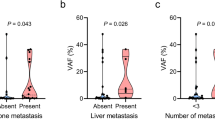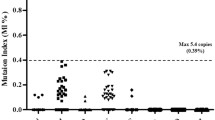Abstract
The proto-oncogene KRAS belongs among the most frequently mutated genes in all types of cancer and is also very important oncogene related to colorectal tumors. The detection of mutations in this gene in primary tumor is a predictive biomarker for the anti-EGFR therapy in metastatic CRC (mCRC); however, the patients with wild-type KRAS can also show resistance to the personalized medicine. The droplet-based digital PCR technology has improved the analytical sensitivity of the mutations detection, which led us to the idea about the optimization of this approach for KRAS testing. In this study, we report the application of ddPCR technology in order to analyze the presence of KRAS mutations in primary tumor and matched metastasis in lymph nodes (LNs) from patients with mCRC and address the question, whether the improvement in the detection method can lower the discrepancies of KRAS mutations detection between the primary tumor and regional LNs. Genomic DNA with wtKRAS and commercial DNA with mtKRAS (G12D) were used to set up the ddPCR reaction. Formalin-fixed paraffin-embedded tissues from primary tumor and positive lymph node from 31 patients with mCRC were analyzed using ddPCR and Sanger sequencing. KRAS status of primary tumors was known; however, the mutation status of lymph nodes was not detected previously. From 31 samples of primary tumors, our results corresponded to results from IVD kit in 30 cases. For one patient, ddPCR detected KRAS mutation in comparison with negative result of the IVD kit. In the samples of metastatic infiltrated LNs, ddPCR detected 16 samples as a WT KRAS and 15 lymph nodes showed positivity for KRAS mutation, whereby Sanger sequencing found KRAS mutations in 8 cases only. We also found two cases where genetic conditions of KRAS gene differed between primary tumor and infiltrated lymph node, both “low-grade” adenocarcinoma. Our study approved that ddPCR method is adequate technique with high sensitivity and in the future may be used as a diagnostic tool for evaluation of KRAS mutations, especially in infiltrated LNs of patients with mCRC.

Similar content being viewed by others
References
Vogelstein B, Papadopoulos N, Velculescu VE, Zhou S, Diaz LA Jr, Kinzler KW. Cancer genome landscapes. Science. 2013;339:1546–58.
Bardelli A, Siena S. Molecular mechanisms of resistance to cetuximab and panitumumab in colorectal cancer. J Clin Oncol. 2010;28:1254–61.
Lievre A. KRAS mutation status is predictive of response to cetuximab therapy in colorectal cancer. Cancer Res. 2006;66:3992–5.
Therkildsen C, Bergmann TK, Henrichsen-Schnack T, Ladelund S, Nilbert M. The predictive value of KRAS, NRAS, BRAF, PIK3CA and PTEN for anti-EGFR treatment in metastatic colorectal cancer: a systematic review and meta-analysis. Acta Oncol. 2014;53:852–64.
Edge SB, Byrd SR, Compton CC. AJCC cancer staging manual. 7th ed. New York: Springer; 2010.
Sobin LH, Gospodarowicz MK, Wittekind C. TNM classification of malignant tumours. 7th ed. New York: Wiley; 2009.
Galon J, Costes A, Sanchez-Cabo F, et al. Type, density, and location of immune cells within human colorectal tumors predict clinical outcome. Science. 2006;313:1960–4.
Galon J, Mlecnik B, Bindea G, et al. Towards the introduction of the ‘Immunoscore’ in the classification of malignant tumours. J Pathol. 2014;232:199–209.
Mlecnik B, Bindea G, Pagès F, Galon J. Tumor immunosurveilance in human cancers. Cancer Metastasis Rev. 2011;30:5–12.
Hari DM, Leung AM, Lee JH, et al. AJCC-7th edition staging criteria for colon cancer: do the complex modifications improve prognostic assessment? J Am Coll Surg. 2013;217:181–90.
Diaz LA Jr, Williams RT, Wu J, et al. The molecular evolution of acquired resistance to targeted EGFR blockade in colorectal cancers. Nature. 2012;486:537–40.
Oltedal S, Aasprong OG, Møller JH, et al. Heterogenous distribution of K-ras mutations in primary colon carcinomas: implications for EGFR-directed therapy. Int J Colorectal Dis. 2011;26:1271–7.
Mao C, Wu XY, Yang ZY, et al. Concordant analysis of KRAS, BRAF, PIK3CA mutations, and PTEN expression between primary colorectal cancer and matched metastases. Sci Rep. 2014;5:8065.
Baldus SE, Schaefer KL, Engers R, Hartleb D, Stoecklein NH, Gabbert HE. Prevalence and heterogeneity of K-Ras, B-Raf, and PIK3CA mutations in primary colorectal adenocarcinomas and their corresponding metastases. Clin Cancer Res. 2010;16:790–9.
Gonzalez de Castro D, Angulo B, Gomez B, et al. A comparison of three methods for detecting KRAS mutations in formali-fixed colorectal cancer specimens. Br J Cancer. 2012;107:345–51.
Harlé A, Busser B, Rouyer M, et al. Comparison of COBAS 4800, TaqMan PCR and high resolution melting PCR assays for the detection of KRAS somatic mutations in fromali-fixed paraffin embedded colorectal carcinomas. Virchows Arch. 2013;462:329–35.
Bösmüller H, Kranewitter W, Webersinke G, Rumpold H, Hackl M, Fend F. Morphological and molecular heterogeneity in colorectal neoplasma with K-RAS mutation. A report of tow cases. Pathol Res Pract. 2017;207:399–402.
van Krieken JH, Jung A, Kirchner T, et al. KRAS mutation testing for predicting response to anti-EGFR therapy for colorectal carcinomas: proposal for an European quality assurance program. Virchows Arch. 2008;453:417–31.
Jasek K, Buzalkova V, Minarik G, et al. Detection of mutations in the BRAF gene in patients with KIT and PDGFRA wild-type gastrointestinal stromal tumors. Virchows Arch. 2017;470:29–36.
Hindson BJ, Ness KD, Masquelier DA, et al. High-throughput droplet digital PCR system for absolute quantitation of DNA copy number. Anal Chem. 2011;83:8604–10.
Pekin D, Skhiri Y, Baret JC, et al. Quantitative and sensitive detection of rare mutations using droplet -based microfluidics. Lab Chip. 2011;11:2156166.
Laurent-Puig P, Pekin D, Normand C, et al. Clinical relevance of KRAS-mutated subclones detected with picodroplet digital PCR in advanced colorectal cancer treated with anti-EGFR therapy. Clin Cancer Res. 2015;21:1087–97.
El Zouhairi M, Charabaty A, Pishvaian MJ. Molecularly targeted therapy for metastatic colon cancer: proven treatments and promising new agents. Gastrointest Cancer Res. 2011;4:15–21.
Miglio U, Mezzapelle R, Paganotti A, et al. Mutation analysis of KRAS in primary colorectal cancer and mathced metastases by means of highly sensitivity molecular assay. Pathol Res Pract. 2013;209:233–6.
Losi L, Baisse B, Bouzourene H, Benhattar J. Evolution of intratumoral genetic heterogeneity during colorectal progression. Carcinogenesis. 2005;26:916–22.
Sherwood JL, Brown H, Rettino A, et al. Key differences between 13 KRAS mutation detection technologies and their relevance for clinical practice. ESMO Open. 2017;2:e000235.
Pender A, Garcia-Murillas I, Rana S, et al. Efficient genotyping of KRAS mutant non-small lung cancer using a multiplexed droplet digital PCR approach. PLoS One. 2015;10:e0139074.
Zhu Y, Lu D, Lira ME, et al. Droplet digital polymerase chain reaction detection of HER2 amplification in formali fixed paraffin embedded breast and gastric carcinoma samples. Exp Mol Pathol. 2016;100:287–93.
Løes IM, Immervoll H, Sorbye H, et al. Impact of KRAS, BRAF, PIK3CA, TP53 status and intraindividual mutation heterogeneity on outcome after liver resection for colorectal cancer metastases. Int J Cancer. 2016;139:647–56.
Lee SH, Chung AM, Lee A, et al. KRAS mutation test in Korean patietns with colorectal carcinomas: a methodological comparison between Sanger sequencing and real-time PCR-based assay. J Pathol Transl Med. 2017;51:24–31.
Hudecova I. Digital PCR analysis of circulating nucleic acids. Clin Biochem. 2015;48:948–56.
Funding
This work was supported by the Biomedical Center Martin (IMTS 26220220187), which is co-financed from EU sources, by the projects of the Slovak Research and Development Agency no. APVV- 14- 0273 and APVV-16-0066, and VEGA Grant 1/0380/18.
Author information
Authors and Affiliations
Corresponding authors
Ethics declarations
Conflict of interest
The authors declare that they have no conflict of interest.
Ethical approval
All procedures performed in studies involving human participants were in accordance with the ethical standards of the institutional and/or national research committee and with the 1964 Helsinki Declaration and its later amendments or comparable ethical standards.
Informed consent
Informed consent was obtained from all individual participants included in the study.
Rights and permissions
About this article
Cite this article
Vanova, B., Kalman, M., Jasek, K. et al. Droplet digital PCR revealed high concordance between primary tumors and lymph node metastases in multiplex screening of KRAS mutations in colorectal cancer. Clin Exp Med 19, 219–224 (2019). https://doi.org/10.1007/s10238-019-00545-y
Received:
Accepted:
Published:
Issue Date:
DOI: https://doi.org/10.1007/s10238-019-00545-y




